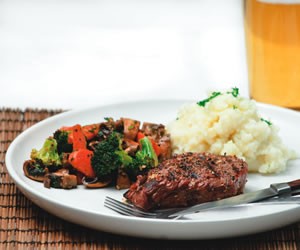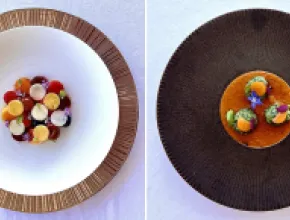As a veteran meeting planner, many of my colleagues ask me for tips about saving on F&B costs—often the second-largest budget item in a meeting. Following is a list I've compiled that planners can clip and save to use when organizing their next meeting.
And remember, if you "blow your own horn," your organization will learn about all the money you've saved them, so tell them about it!
- Compare alcoholic beverage purchasing methods: by the drink, by the bottle or by the person for a specific amount of time. If serving hard liquor, consider buying from a less-expensive brand category to reduce cost. Or, eliminate hard liquor and serve only beer and wine.
- Compare per person pricing for a continental breakfast and/or reception vs. price of items purchased in bulk (a la carte); i.e. Danish or hors d'oeuvres by the dozen, hors d'oeuvres per 100-count, coffee by the gallon. It is usually more economical to purchase in bulk/a la carte.
- Dessert from lunch can be saved until the p.m. break. Sometimes there is a small charge to serve the item later in the day.
- Do NOT make a "last call" announcement before closing bar. This not only saves money, but can limit the liability of the host.
- NOT putting out "to go" cups at coffee station reduces coffee consumption.
- Guests eat less during receptions if their attention is diverted by entertainment, music or dancing.
- Giving accurate guarantees and maintaining attendance history can save money.
- Reduce the guarantee for breakfast if the night before was a "late night." Breakfast counts generally go down each day of the meeting, with the exception of the morning there is a prominent breakfast speaker or program.
- Consider distractions close by when giving lunch counts. If shopping or restaurants are in close proximity, some attendees may pass up the group lunch.
- Verify attendance at food functions with local attendees and speakers. Some may not plan to attend breakfast or stay for the evening function, or speakers may be testing equipment during a meal function.
- Reduce coffee service; sell coffee at kiosks.
- If guests come directly to a cocktail reception following a meeting, consumption of hors d'oeuvres will be less than if they relax and come an hour later.
- If the hotel has a happy hour, request a private area to receive similar pricing.
- Eliminate bar service and serve only butlered (waiter passed) drinks to lower consumption—butlered drinks plus bar service increases consumption.
- In lieu of a hosted lunch, have the hotel set up a cash-and-carry buffet.
- Instead of bottled water, provide water pitchers or water coolers.
- Instead of a closing luncheon, give out hotel restaurant vouchers. Many attendees will not utilize the voucher.
- Compare costs for small groups (under 15) to eat in the hotel restaurant vs. catered meal.
- Instead of setting up a refreshment break at each breakout room, establish centralized breaks; there will be less coffee/food waste.
- Negotiate to have iced tea and coffee included in the meal price.
- To reduce consumption, shorten the cocktail reception by 15 minutes, or even 30.
- Order sandwiches for entertainers and crew instead of serving full banquet meals.
- Purchase all individually packaged items (snack bars, boxed cereals, soda in cans, bags of chips, individual yogurt, etc.) on consumption. Verify counts with the banquet captain for accuracy.
- Replace a full breakfast with the lowest-priced continental breakfast, adding cereal and yogurt "on consumption."
- Request only one wine glass at dinner for a choice of red or white wine. This saves on wine consumption.
- Roll away the continental breakfast and/or break when it is time for the meeting to start. This saves money and encourages attendees to arrive on time.
- Seek sponsors for receptions, meal functions or coffee breaks.
- Select the most economical serving method. Plated meals are less expensive than buffets.
- The value of your business to the facility might justify a free cocktail reception or beverages and cookies at the registration desk. Discuss this during the contract negotiation stage.
- Use all-inclusive facilities that have meals and talent in one price, i.e. restaurants, cruises, theme parks.
- When purchasing liquor by the bottle, marry the bars near the end of the reception. Close one bar and move partials to another bar. This eliminates the unnecessary opening of additional bottles.
- When signing contracts, avoid clauses that bind you to a certain number of people per food function. Replace this with a minimum dollar amount for food and beverage for the length of the meeting. This allows you to distribute spending, according to your needs, among meal functions.
- Due to limited access, consumption will be less if hors d'oeuvre tables are pushed against a wall. Consumption of hors d'oeuvres increases when there is 360-degree access.
- Butlered (waiter passed) hors d'oeuvres save money, as less food is required.
Arlene Sheff, CMP, is the senior meeting and event planner for The Boeing Company, where she produces senior-level meetings and events. She can be reached at sheffarlene@gmail.com.






